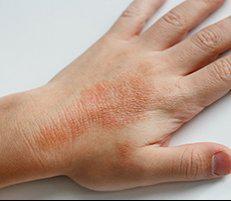Eczema
Midwest Allergy Sinus Asthma, SC
Eczema Q & A
What is eczema?
Eczema, or atopic dermatitis, is a condition that causes your skin to become red and itchy. Its flare-ups may or may not include asthma or hay fever. Common symptoms of atopic dermatitis include:
- Mild to severe chronic itching
- Dry skin
- Small raised bumps that can leak fluid when you scratch them
- Scaly, cracked, and thickened skin
- Red or brownish-gray patches of skin
- Rashes
In addition, if you scratch your skin, it will likely become swollen, sensitive, and raw.
What causes eczema?
Eczema is most often caused by a variation in the gene that helps your skin retain its moisture and block out allergens, irritants, and bacteria. When your skin doesn’t have proper moisture retention and protection, you’re vulnerable to environmental irritants and allergens.
Most often, eczema first appears in children under the age of five. This type of eczema is known as infantile eczema or baby eczema. Infantile eczema causes rashes, redness, and scaly, dry skin.
Sometimes, eczema is a food allergy reaction. Winter-itch is a type of eczema that flares up in the winter when air is especially dry.
What is the treatment for eczema?
Depending on your symptoms, age, and the severity of your eczema, there are a number of eczema treatments available to you. These include:
Steroid creams
The practice may prescribe you a steroid cream, like hydrocortisone, to quickly reduce inflammation and relieve itching. Steroid creams come in a variety of different strengths.
Nonsteroid creams
Nonsteroid creams, like the NSAID ointment crisaborole, treat mild to moderate eczema by reducing inflammation.
Allergy shots
If your eczema is caused by allergies, you may benefit from a round of allergy shots. Allergy shots contain a small dose that which you’re allergic to in order to help reduce or eliminate your reaction. This treatment is a type of immunotherapy.
Biological medications
Clinical research has yielded an option for severe eczema sufferers: Biological, or biologic, medications. These newer, injectable anti-inflammatory medications might be a good choice for you if you haven’t responded to other treatments.
At home, you can treat your eczema by:
- Moisturizing at least two times a day
- Applying an anti-itch cream up to twice a day after moisturizing
- Taking oral antihistamines
- Applying bandages to the affected area
- Enjoying a warm bath with uncooked oatmeal, colloidal oatmeal, or baking soda
- Using an in-home humidifier
- Using mild, perfume- and dye-free soaps
- Addressing stress and anxiety
- Wearing breathable, comfortable, and smooth clothing
It’s also very important that you don’t scratch your eczema.
Are you ready to find a solution for your eczema? Call or book an appointment online with Midwest Allergy Sinus Asthma today.
If you currently have moderate-severe eczema or atopic dermatitis, see if you are eligible for our paid clinical trial study. It is a great way to get special care by expert providers you trust while contributing to treatment innovations.
